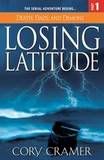"Circling" / Tom Piccirilli
 from Shroud Magazine / January 2008
from Shroud Magazine / January 2008
Reviewed by: Anthony J. Rapino
It’s not often one sees the narrative structure of a story conform to its theme, yet this is just what Tom Piccirilli accomplishes in “Circling” from the inaugural issue of Shroud. The themes and ideas Piccirilli presents early in the story resurface throughout, creating a circular story structure. This thematic echo also manifests through the characters’ actions as they circle – both literally and metaphorically - the tracks surrounding the town and their lives. Even the repetition of such lines as “It never ends” reinforces the notion of revolving found in the story.
In “Circling”, Johnny Bent decides to dig up his father’s corpse. It’s Johnny’s hope that DNA testing will offer proof of paternity. But before Johnny can make it to the graveyard, a Mazda filled with three bank robbers pulls up behind his car, and the ensuing altercation is both a unique and surprising turnabout. Johnny also meets Lorelei, his grave robbing partner, during the botched getaway.
Johnny and Lorelei go on to circle the town as they become better acquainted, eventually finding their way to the graveyard. It is there that Lorelei questions her own family tree to surprising response.
While “Circling” presents a fast-paced and interesting story with its fair share of gasp-inducing moments, it also offers multitudinous layers of meaning. Piccirilli is sure to please different types of readers here: those looking for a bit of blood and those looking for a bit of deeper meaning. Read it once for the murder. Read it a second time for the marvel of its well-crafted themes.
Purchase Shroud Magazine featuring Tom Piccirilli's "Circling."
Dark Resurrection / John A. Karr
 Samhain Publishing, Ltd. / October 2007
Samhain Publishing, Ltd. / October 2007
Reviewed by: Martel Sardina
When the record industry started labeling albums for explicit content back in the mid 1980’s, many musicians rejoiced when their album received a warning label because they knew that being deemed explicit would translate into additional sales. This led to a glut of bands putting out albums that excelled at capitalizing on shock value but didn’t hold up over time. John A. Karr’s Dark Resurrection comes with a warning about the content though it is unclear whether or not his work will suffer the same fate.
In Dark Resurrection, Victor Galloway, a prominent surgeon, is happily married to Lenora. They have a young son, Walt, a nice house, and a seemingly normal life. When Victor suffers a heart attack, he manages to call for help unaware that the emergency personnel who respond have no intention of saving him. Victor is taken to Holy Evangelical Lady of the Lake (H.E.L.L.) , a hospital run by Tobias, a zombie. Tobias offers a nearly-dead Victor immortality in exchange for using his surgical skills to harvest the hospital’s living patients to feed the growing number of undead.
Victor accepts the offer in order to keep his family from becoming a part of Tobias’s evil scheme. To the outside world, Victor Galloway is dead. But inside H.E.L.L., a re-animated Victor is born. For reasons that are not explained, Victor is a zombie with a conscience - one who does not want to participate in Tobias’s plans.
Meanwhile, Ray Brennan, a newly hired computer programmer, notices that things in H.E.L.L. don’t operate in the same manner as the rest of corporate America. Ray’s boss wants him to limit his focus strictly to his assigned duties. When Ray questions the department’s practices, he is told to do his job, not worry about analyzing the underlying data in the various systems. Being stonewalled only peaks Ray’s curiosity, sending him on a quest to find out what is really going on.
Ray becomes romantically involved with Victor’s widow. When Ray finally learns of Tobias’s scheme, Victor and Ray wind up joining forces with intention of stopping Tobias and keeping Lenora and Walt out of harm’s way.
The novel’s premise is intriguing. However, from the story’s beginning, there is a disconnect with regard to the characters. The reader is not given a chance to care about Victor, his family, and the life that is taken from him. The reader is told that these things are important to Victor but because the reader does not know Victor when his life and family are taken, it is hard to care about what happens next and why.
Several of the characters acted unbelievably at times. For example, the reader is led to believe that Victor’s wife, Lenora is a distraught widow. She is struggling to deal with losing Victor as well as being a single parent. However, when she meets Ray Brennan, their relationship becomes intimate very quickly – too quickly - given her history. The sex scenes and some of the graphic acts of violence that occur do not appear to be integral to developing the characters or furthering the plot. There is even an instance where the same scene is repeated (once from Victor’s point-of-view and once from Ray’s point-of-view) but no new information is given to push the story forward.
While Dark Resurrection contains all the right elements for a chilling tale of terror, Karr’s execution lacked the precision that could have made this novel into a spellbinding page-turner. Zombie fans may enjoy the story for its spin on the use of the hospital setting and medical industry as a means of zombie propagation.
Purchase John A. Karr's Dark Resurrection.
Losing Latitude / Cory Cramer
 Part 1: "Death, Dads and Demons"
Part 1: "Death, Dads and Demons"
Part 2: "The Past Comes Back To Haunt Us"
Part 3: "Goodbyes and Getaways"
Part 4: "The Last Place To Run"
Part 5: "Revelations"
Remarco Publishing / 2006-2008
Reviewed by: Blu Gilliand
In 1996, Stephen King breathed new life into a literary gimmick lost to the days of Dickens – the serial novel. While King’s six-part novel The Green Mile was a success, the reading public’s fascination with the experiment didn’t linger after the final installment hit the stands. A few half-hearted attempts to capitalize on King’s success followed, but for the most part the format retreated into obscurity.
Beginning in 2005, Losing Latitude author Cory Cramer tried once again to revitalize the format with his self-published five-part story of murder, mystery, artifacts and demons. Unfortunately, while the elements for a good yarn are in place, Cramer doesn’t quite have the grasp of pacing and storytelling needed to pull it off.
The story begins on a strong enough note. 17-year-old Lilly North lives on a boat with her parents. The family has spent the last ten years sailing from one exotic port to the next, pursuing evidence to support Brady North’s esoteric theories about ancient civilizations and aliens – theories that cost him a high-profile gig as a Berkeley professor. When a storm at sea brings their adventure to a tragic end, Lilly is left stranded at a military hospital in Cuba with no family and no friends – nothing to her name but a handwritten journal salvaged from the boat and a cool million in the bank.
As Lilly recuperates and tries to piece together the true nature of her father’s quest, she starts reading the journal, which belongs to a young man named Buck McGee. McGee is on the run – his father is dead, and Buck may have killed him. Plus, there’s a man on his trail, a man that Buck believes is actually a demon responsible for his father’s death.
So here we have the ingredients for a good adventure novel, ripe with cliffhanger possibilities. We’ve got two characters in completely different situations – but we know their stories have to eventually come together. We’ve got questions galore about how the two are connected, and how the ripples from one story are going to cross over into the other.
The setup is good. Unfortunately, the execution is not.
For us to really get involved, we have to believe in Lilly and Buck as characters. Cramer’s decision to tell Buck’s story solely through his journal entries seems like a perfect choice, one that would allow us an intimate look at both the events Buck is describing and at Buck himself. However, Cramer fails to distinguish Buck’s voice from that of the rest of the book. The journal entries read exactly the same as Lilly’s narrative, with only their presentation in a faux-handwriting font providing any sort of distinction.
As for Lilly, her story moves far too slowly to maintain interest. For the majority of the first three books in this series, Lilly is in her hospital room, reading Buck’s journal. Because Cramer has to keep her - as one of the book’s main characters - high in readers’ minds, he checks in on her quite frequently. Unfortunately, rather than moving her story forward, we’re treated to long passages about the boredom of being in a hospital and the inadequacies of the hospital’s shower facilities. There’s a bland attempt at romance with one of the male nurses, but otherwise Lilly spends much of the time just reading. Her story does finally kick-start later in the series, but at that point it’s too little, too late.
Cramer, who admits on his website that he began writing Losing Latitude because writing a book sounded more desirable than getting a “real job,” simply doesn’t have the chops to pull off a story as ambitious as he set out to write. There are some good ideas and a lot of potential in the plot Cramer sets forth, but nothing really gets off the ground. Many of the passages are clunky and uninspired, and the sense of excitement and tension that is so vital to this genre is almost completely absent.
As noted above, Cramer chose to go the independent route with Losing Latitude, a decision made (according to his website) without having sent the manuscript to a single agent or publisher. The lack of professional editing really shows in the book’s long, meandering passages and generic voice. If Cramer hopes to grow and succeed as a writer, he needs to think seriously about opening up his work to the critique and polishing of professionals.
Purchase Cory Cramer's Losing Latitude series.
Dark Hollow / Brian Keene
 Leisure Books / January 2008
Leisure Books / January 2008
Reviewed by: Jeff Burk
Six months following the release of his last Leisure offering – 2007’s Dead Sea - Brian Keene returns with Dark Hollow. In this paperback reprint of The Rutting Season, readers find Keene once again breaking away from the zombie yarns he is so well associated with and instead weaving an emotional horror drama more in the vein of Terminal and Ghoul.
There have long been stories of ghosts and monsters inhabiting the Pennsylvania woods around LeHorn's Hollow. None of the locals have paid much mind to the tales – that is until a strange, hypnotic music begins emanating from the woods and induces bizarre sexual behavior in the townsfolk and the women start to disappear. When local writer Adam Senft's wife begins to fall under the wood's strange spell, he sets out to stop it before he loses woman he loves.
Dark Hollow's sense of horror manifests itself from the strong sexual grip the wood’s dark forces hold over the characters. Throughout the novel, Adam's fears of sexual inadequacy and anxieties over childbirth are exploited by this energy, creating a story that balances personal drama with the supernatural. Keene knows how to torment his characters, and it will be a cold-hearted reader who won’t feel for Adam's plight.
Despite the new mass-market facelift, savvy readers will be able to tell that this novel was written earlier in Keene's career. Characters speak in an overly obvious manner at times, often explaining plot to the reader rather than telling the story through action and their interaction with each other. At several points near the end, there are some nagging coincidences that come across as a little too convenient to maintain continuous credibility. Fortunately, these intermittent flaws are easy to overlook due to the overwhelming strength of other aspects of the novel – including its strong sense of setting and atmosphere.
Dark Hollow is another frightening entry in Brian Keene's already impressive arsenal. The book deftly combines emotional terror and grisly gore with Keene's immensely readable prose to create a gripping novel sure to please longtime fans and new readers alike. At the very least, Dark Hollow will leave readers satiated enough for the next six-month stretch.
Purchase Brian Keene’s Dark Hollow.
Sins of the Sirens / Edited by John Everson
 Dark Arts Books / January 2008
Dark Arts Books / January 2008
Reviewed by: Derek Clendening
Four literary mistresses of the night, teamed up for one book, can be an alluring and dangerous proposition, as editor John Everson notes in his introduction to Sins of the Sirens. Taking a unique approach to the multi-author anthology format by featuring only a quartet of voices, Sins offers up fourteen stories by Loren Rhoads, Maria Alexander, Mehitobel Wilson, and Christa Faust – the four ‘sirens’ chosen to lure the reader into some dark and sinister territory. The overall theme is akin to Jeff Gelb and Michael Garrett’s Hot Blood series, but Sirens packs a much stiffer punch. Everson’s anthology certainly succeeds in its goal to offer sensual terror from an all-female perspective.
Loren Rhoads’ “The Angel’s Lair” sets the stage for the recurring theme of female empowerment in this tale of female sexual dominance over her male counterpart. Comparable themes are ever-present throughout her other tales - and throughout the anthology in general.
Although there is not a single story in the anthology that is not well-written, Mehitobel Wilson stands out as the most powerful voice here, with her contribution “Parting Jane” offering perhaps a more literary approach than any other story in the collection. Told through the unique perspective of an ill, nine-year-old girl, “Parting Jane” offers a significant departure in tone in a collection that suffers at times from recycled themes carried from one story to another.
Perhaps the thematic ties in Sins of the Sirens bind too tightly. Indeed, the anthology’s flaws seem rooted in its lack of variety. Although Wilson’s “Parting Jane” adds a much needed change of pace to the anthology’s recurring themes of sexual dominance, sadomasochism, fetishes, and drugs, the tale does not appear until three quarters into the book. Yet despite this thematic repetition, readers will likely find the stories compelling and exceptionally readable.
Overall, Sins of the Sirens is a worthy anthology that acquaints readers with four notable genre voices. It’s yet another solid addition to the growing catalog of Dark Arts Books and a fine example of the positive contributions of the horror small press. Sins’ subject matter is a perfect fit for the small press, and Everson does an excellent job catering to the specific tastes of those who like their horror on the sensual side - with just a hint of the nasty.
Purchase Sins of the Sirens, edited by John Everson.
At The City's Edge / Marcus Sakey
 St. Martin’s Minotaur / January 2008
St. Martin’s Minotaur / January 2008
Reviewed by: Martel Sardina
Crenwood, the fictional South Side Chicago neighborhood where Marcus Sakey’s characters come out to play, is rendered so beautifully on the page that readers may not believe that it really doesn’t exist. Crenwood itself is not beautiful. Poverty, drugs and gangs have turned the neighborhood into a war zone. Jason Palmer should know. Palmer recently returned to Chicago after an “other than honorable” discharge from the Army, after being deployed to Iraq. Palmer has seen the horrors of war and, upon his return, finds that the horrors of a different war await him.
Jason’s older brother, Michael, is no stranger to Crenwood’s perils. Michael’s wife, Lisa, was killed in an accident caused by a police chase, leaving him a widower and a single father to their young son, Billy. In the wake of Lisa’s death, Michael becomes an activist, in the hope of making Crenwood a safer place to live. What Michael doesn’t realize when he undertakes this mission is that some people have a vested interest in keeping Crenwood the way that it is.
When Michael is murdered, Jason vows to find his killer. Elena Cruz, a talented officer with the Gang Intelligence Unit, and Michael’s friend, wants to bring the killer to justice, but knows finding the responsible party will not be easy. Crenwood’s residents want safety, a need so basic that many people on the outside take it for granted. They need the help of the police to achieve that goal. But dirty cops and others who want to maintain the status quo leave residents tight-lipped and questioning who is really on their side. And thus begins the rollercoaster ride that combines fiction with a biting social commentary that at times is so painful, it hurts to read.
Jason slowed the Caddy, rolling down the ramp at a bare crawl. He’d never been down here before. What most people thought of as Lower Wacker was actually the second level, a throughway that wrapped along the river and provided a short cut to dodge the traffic lights and gawking tourists of the surface streets. Everybody knew that Wacker, but he doubted many had taken the ramps down one more level, to the bowels of the city, a bleak lost place where service trucks moved between exhaust-stained roll doors under the timeless haze of yellow sodium light.
This world belonged to people the one above tended to forget. Garbagemen, repair crews, delivery drivers. Scores of homeless huddled under iron girders. They all had the same blanket, which baffled Jason until he realized where the blankets came from. They were hotel linens, grown too ratty for paying customers. Tossed in the Dumpster and repurposed by an army of the forgotten that slept shoulder to shoulder in the street beneath the Hyatt. The lowest tier of hotel guest.
It seemed like a beautiful, terrible symbol, though he couldn’t have said of what, exactly.
Jason coasted to a stop where Stetson intersected Wacker. Felt that tingle in his fingers. He didn’t know exactly when the meet would take place, but probably not till closer to midnight. It was eight now; he’d come early to see how it looked.
Lousy.
Following up a debut novel - 2007's The Blade Itself - that made several year-end “Best of ” lists is a daunting task, but Marcus Sakey has nothing to fear. He demonstrates a maturity that many authors take years to develop in his sophomore effort. Readers will find themselves sucked into Jason Palmer’s world and be hard pressed to get out of it. Sakey’s prose reflects a voice all his own, but draws on and improves upon the storytelling style of page-turning masters like Dennis Lehane, David Morrell and Elmore Leonard.
Purchase Marcus Shakey's At The City's Edge.
Blind Fall / Christopher Rice
 Scribner / March 2008
Scribner / March 2008
Reviewed by: Vince A. Liaguno
The past’s collision with the present casts lingering shadows on the future in Christopher Rice’s latest thriller, Blind Fall. In a bold departure only hinted at in his previous novel Light Before Day (2005), Rice takes on the military and a straight protagonist in this breakneck-paced psychological thriller. Blind Fall tells a classic military-themed story of redemption and revenge against the contemporary backdrop of the Iraq War and its aftermath on the brave soldiers who serve – all wrapped up in the intricately layered narrative style for which Rice first garnered both fans and critical notice with A Density of Souls (2000) and The Snow Garden (2001).
John Houck is a man haunted by his past – the specter of his younger brother’s suicide, an estrangement from the sister who raised him, and the guilt over a critical mistake made during a special ops mission that left Mike Bowers, the venerated captain of his Force Recon Company, badly injured. Struggling to assimilate to civilian life, Houck decides to pay a long-overdue visit to his former captain only to stumble across a grisly murder scene and the unlikely revelation of Bowers’ homosexuality. Houck soon realizes that Alex Martin, Bowers’ male lover, was the intended target and that the local authorities may have more than just a passing interest in the case. In order to posthumously repay his debt of honor to Bowers, Houck decides to protect Martin despite mounting odds that include a disappearing corpse, a police manhunt, and the collapse of his own belief system.
Aside from one extended passage concerning Martin’s survivalist training that reads like a gay version of G.I. Jane meets A Few Good Men and threatens to overstay its tenuous welcome, subplots converge tidily, if at times improbably, in Rice’s patented tension-filled denouement. Wisely, Rice plays down the homoeroticism of previous efforts like Density and Snow Garden in favor of tension that originates from the circumstances his characters find themselves in – thus avoiding what could have too easily become a straight-gay military fantasy in print. It’s a further sign of the welcome literary maturity readers glimpsed in Light.
As in his earlier New Orleans-set Density and New England-set Snow Garden, setting plays a key role here – a full-fledged minor character among the well-stocked ensemble. Rice has a keen eye and obvious appreciation for the dichotomous California locations that serve as set-pieces for Blind Fall’s action – from the log cabin charms of mountain towns to the north and opulent seaside resorts dotting coastal lines to the south to the arid, windmill generator-strewn desert in between:
John returned his attention to the road; up ahead he saw the trailer Patsy has described. It sat behind a chain-link fence. The walls had been painted baby blue, and there was a children’s playground in the front yard, in the shadow of an enormous, multibranched Joshua tree. Ribbons of various colors had been tied along the top of the front fence. There was nothing that spoke more to him of the desert than a run-down trailer whose owner had gone to every pathetic attempt to dress it up that she could afford. In Louisiana, nature itself would bring canopies of greenery to the most impoverished of homes. In the desert, the unforgiving light allowed hardship few disguises.
Thematically, Blind Fall is a mixed bag, and one could almost fault Rice for over-ambition if he hadn’t kept the myriad themes so well-balanced and in-check. While misconceptions, denial, the ravages of guilt, and homophobia remain poised on the periphery of Rice’s thematic landscape, it’s his sharp yet subtle observations on codes of honor and gay military service that stand front and center. And while one can almost imagine the heavy-handedness with which a gay writer writing about the hypocrisies of gay military service in America could weigh down the prose, Rice instead opts for a remarkable restraint here, rendering his commentary with an understated poignancy:
He froze when he saw that the dark mass gathered at the bottom of the box was Mike’s dress blues, several gold buttons staring up at him like coins in the bottom of a grime-covered fountain. Their condition, as well as their position, beneath tattered hardcover novels and framed diplomas, was too appropriate a symbol of what had become of Mike’s life for John to linger on them for too long.
Depicting how Mike Bowers’ exemplary military service is systematically written off by his parents and overshadowed in the media by the revelation of his sexual orientation, Rice discounts the military as an institution that holds honesty as one of its core tenets and exposes the don’t ask, don’t tell policy for the whitewash of truth that it really is. Even in his acknowledgements, Rice thanks only the nebulous “several Marines” with whom he consulted on the book, acknowledging that to mention them by name might imperil their good standing. It’s in this intrinsic sadness at the heart of Blind Fall – both in the idea of a fallen Marine and in the notion that he fell alone – that imbues the book with its emotional depth.
Blending elements of psychological suspense with straight-ahead crime noir while generously stacking his literary deck with layers of mystery, Rice fashions a tense military-edged thriller reminiscent of In the Valley of Elah that’s interspersed with shades of Dennis Lehane’s Mystic River and John Morgan Wilson’s Rhapsody in Blood. Addictive from page one, Blind Fall will catapult readers into a dizzying freefall of anticipation that gains in momentum with each successive turn of the page.
Purchase Christopher Rice’s Blind Fall.




